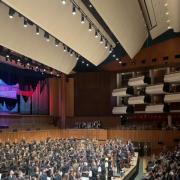
It is no secret that the upper echelons of Pop music are a heated hot bed of inherent privilege, toxic masculinity , and more than that, unashamed exclusivity; it is unsurprising then perhaps, that the top of charts are populated by the vibrating bass tones of misogynistic rap and the sensual crooning of tragically privileged American darlings, an unfailing celebration of the English language and all its intricacies. However, in the last few years, an infusion of Spanish into the world of popular pop music has fuelled its reputation as a sexy language. In the summer of 2017, there was seldom a day when ‘Despacito’ ceased to be blared out of every radio station, and ‘Senorita’ , released in July , starring the Latina singer Camila Cabello was dubbed by many ‘the anthem of the summer.’ The implication is clear: Spanish is trendy , intoxicatingly indecipherable and ergo an easy way to sprinkle some exotic aplomb into your song-writing. And now, I have yet to hear a day when a German pop song is played, even as a consequence of tokenism, on any British radio station.
Now, the great observant swathes might here highlight that to see any French song occupying one of the coveted top spots is a rarity in itself, and yet the glamorisation of France’s dreamy capital, in a multitude of pop anthems: such as ‘Paris’ by the Chainsmokers , and in a plethora of Disney films, such as the charming cartoon ‘Aristocats’ leads to a perception of French as the gorgeously soft tongue of romantics. In a survey carried out by the Travel comparison site Kayak, to explore which accents the general public finds the most alluring, out of a pool of 1,000 Britons, British men found the French accent to be the sexiest, with 31% expressing a preference for it.
Although amongst the (surprisingly large) number of surveys relating to the most enticing accent, I have yet to discover one where German was listed in the top 10, or frankly, at all. A survey carried out by the Daily mail listed Spanish and French, both in the top 10 sexiest languages, whereas the Indy 100 paper suggested that were ranking in the top 5. Whilst a positive result in a strange online survey might not be the most dazzling merit of a European language, there seems to be a strangely unanimous proclamation of German as ‘unsexy’.
This derogatory view of German is fuelled by a Western media who seem to possess a cavalier disregard for the German culture, and a baseless desire to vilify Germans. In wonder woman, the villain is German; in Pitch Perfect 3, the rival pop group to the sweet all-American girl band are a group of cuttingly condescending German girls, with a penchant for ruthless self-advancement, and in the Secret Life of pets, the vicious animal-abusing villain is a German circus owner. It seems that to be a villain, another tick box quality is to have an accent governed by the guttural sounds of German. Yet this language is a far from being the wild untameable tongue of delinquents; it has a delightful and unfailing logic, which makes it far more satisfying to learn, and translate, than the fast-paced flow of its Mediterranean competition. And, although, perhaps a contrast to the artsy chicness that prevails in Paris, when I visited Berlin, as a young child, it struck me as a vast and vibrant city with a fascinating, albeit slightly dark, history. To captivate my attention was quite a feat for any destination, as I was a child so prone to lamenting the dullness of the ‘touristy stuff.’ The jarring bluntness supposedly possessed by the city’s inhabitants, was seemingly non-existent , and the polite, and endearingly honest tones which were spoken in, provided a refreshing contrast to the, unfailingly loud and brash ones favoured by some ostentatious inhabitants of my own hometown.
Despite this, the myth of the rambunctious German is a hard one to dispel. In a recent article by the Globalist, it was highlighted that a mere 1% of Britons spend their holidays in Germany as tourists, and about 1% of British students at the A-level learn the German language in school. In my own experience of learning history, and in many other British history lessons , virtually no mention of Germany is made after the Holocaust and World War II. For all practical purposes, references to Germany stop in 1945. This undoubtedly colours our view of the Germanic language, as does little to contradict stereotypes already embedded in the deeply flawed, and in some ways closed-minded nation of Britain.
In an era when society is rife with open racism, and unremitting personal attacks, it is perhaps frivolous to discuss which language we most prefer the sound of , but the unwarranted vilification of a nation who, are in 2020 displaying all the qualities of modern and metropolitan society is perhaps indicative that, we must open our minds as well as our ears, to the German nation, because though it may not be sexy, it is worth listening to.


























